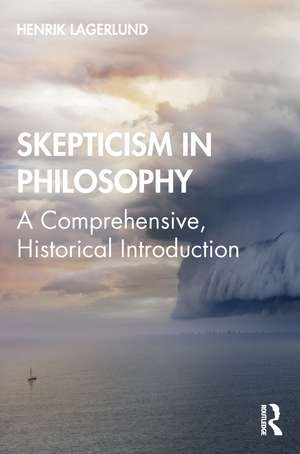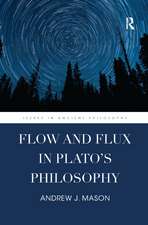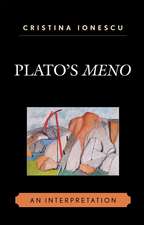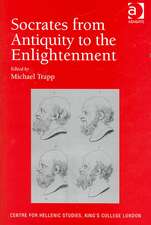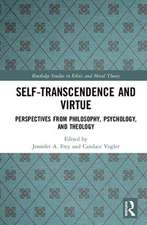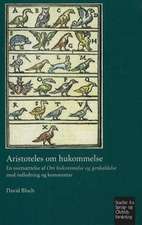Skepticism in Philosophy: A Comprehensive, Historical Introduction
Autor Henrik Lagerlunden Limba Engleză Paperback – 14 mai 2020
Along the way, the book covers skepticism during the Latin, Arabic, and Greek Middle Ages and during the Renaissance before moving on to cover Descartes’ methodological skepticism and Pierre Bayle’s super-skepticism in the seventeenth century. In the eighteenth century, it deals with Humean skepticism and the anti-skepticism of Reid, Shepherd, and Kant, taking care to also include reflections on the connections between idealism and skepticism (including skepticism in German idealism after Kant). The book covers similar themes in a chapter on G.E. Moore and Ludwig Wittgenstein, and then ends its historical overview with a chapter on skepticism in contemporary philosophy. In the final chapter, Lagerlund captures some of skepticism’s impact outside of philosophy, highlighting its relation to issues like the replication crisis in science and knowledge resistance.
| Toate formatele și edițiile | Preț | Express |
|---|---|---|
| Paperback (1) | 365.91 lei 6-8 săpt. | |
| Taylor & Francis – 14 mai 2020 | 365.91 lei 6-8 săpt. | |
| Hardback (1) | 764.20 lei 6-8 săpt. | |
| Taylor & Francis – 18 mai 2020 | 764.20 lei 6-8 săpt. |
Preț: 365.91 lei
Nou
Puncte Express: 549
Preț estimativ în valută:
70.02€ • 76.04$ • 58.82£
70.02€ • 76.04$ • 58.82£
Carte tipărită la comandă
Livrare economică 22 aprilie-06 mai
Preluare comenzi: 021 569.72.76
Specificații
ISBN-13: 9781138555563
ISBN-10: 1138555568
Pagini: 254
Dimensiuni: 152 x 229 x 15 mm
Greutate: 0.36 kg
Ediția:1
Editura: Taylor & Francis
Colecția Routledge
Locul publicării:Oxford, United Kingdom
ISBN-10: 1138555568
Pagini: 254
Dimensiuni: 152 x 229 x 15 mm
Greutate: 0.36 kg
Ediția:1
Editura: Taylor & Francis
Colecția Routledge
Locul publicării:Oxford, United Kingdom
Public țintă
UndergraduateCuprins
Introduction 1. Pyrrhonism and Sextus Empiricus 2. Academic Skepticism 3. Augustine and Early Medieval Skepticism 4. Al-Ghazali and Skepticism in Medieval Arabic and Greek Philosophy 5. God as a Deceiver: External World Skepticism in Later Medieval Times 6. Skepticism in the Sixteenth Century: Montaigne, Charron, and Sanches 7. Descartes’s Methodological Skepticism, Bayle’s Super-Skepticism, and Berkeley’s Anti-Skepticism 8. Hume’s Skepticism and Hume on Skepticism 9. The Anti-Skepticism of Thomas Reid, Lady Mary Shepherd, and Immanuel Kant as well as Skepticism in German Idealism 10. G.E. Moore and Ludwig Wittgenstein on Skepticism 11. Skepticism in Contemporary Philosophy 12. Non-Philosophical Skepticism
Notă biografică
Henrik Lagerlund is Professor of the History of Philosophy at Stockholm University, Sweden. He works primarily on medieval and Renaissance philosophy, and has written several articles and books. He is also the editor of The Routledge Companion to Sixteenth Century Philosophy (2017) and The Encyclopedia of Medieval Philosophy, Second Edition (2020).
Recenzii
"Henrik Lagerlund’s Skepticism in Philosophy: A Comprehensive, Historical Introduction has the rare distinction of offering a rich and thorough historical overview of skeptical thought, while nonetheless remaining engaging and accessible throughout. This book will be particularly welcomed by those teaching in this field."
Duncan Pritchard, University of California, Irvine, and The University of Edinburgh
"Henrik Lagerlund's Skepticism in Philosophy: A Comprehensive, Historical Introduction is precisely this: comprehensive and historical, but more than anything, a philosophically rich engagement with skepticism. The book will engage and enlighten any philosopher thinking about skepticism and the history of epistemology. Lagerlund offers a compelling alternative to Richard Popkin's influential claim that modern philosophy gets off the ground through a "Pyrrhonian crisis" in the 16th century. Lagerlund identifies an earlier, momenteous shift. 14th century philosophers accept a premise that changes the landscape of epistemology: God could deceive us. They also accept a premise that changes the foundations of theology: God's omnipotence can make things happen without the help of natural causes. Put together, these premises provide a framework in which early modern skepticism can flourish. Lagerlund's analysis of this shift puts thinkers like Ockham and Buridan into the limelight, and prepares the ground for a fresh glance at modern arguments."
Katja Maria Vogt, Columbia University
". . . a lively, readable, and reliable history of skepticism—in the western tradition."
Stephen Leech, Keele University in Philosophy in Review
Duncan Pritchard, University of California, Irvine, and The University of Edinburgh
"Henrik Lagerlund's Skepticism in Philosophy: A Comprehensive, Historical Introduction is precisely this: comprehensive and historical, but more than anything, a philosophically rich engagement with skepticism. The book will engage and enlighten any philosopher thinking about skepticism and the history of epistemology. Lagerlund offers a compelling alternative to Richard Popkin's influential claim that modern philosophy gets off the ground through a "Pyrrhonian crisis" in the 16th century. Lagerlund identifies an earlier, momenteous shift. 14th century philosophers accept a premise that changes the landscape of epistemology: God could deceive us. They also accept a premise that changes the foundations of theology: God's omnipotence can make things happen without the help of natural causes. Put together, these premises provide a framework in which early modern skepticism can flourish. Lagerlund's analysis of this shift puts thinkers like Ockham and Buridan into the limelight, and prepares the ground for a fresh glance at modern arguments."
Katja Maria Vogt, Columbia University
". . . a lively, readable, and reliable history of skepticism—in the western tradition."
Stephen Leech, Keele University in Philosophy in Review
Descriere
Henrik Lagerlund offers students, researchers, and advanced general readers the first complete history of what is perhaps the most famous of all philosophical problems: skepticism.
